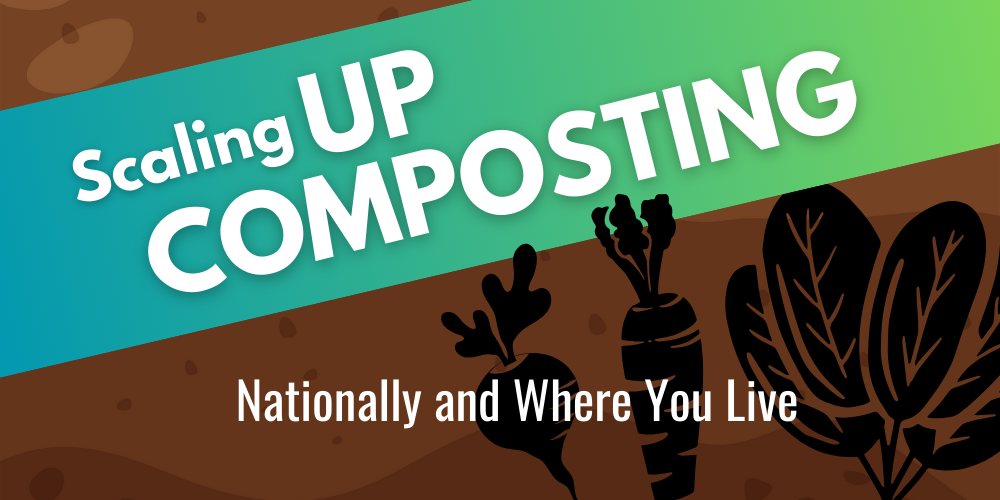Scaling Up Composting, Nationally and Where You Live

Diverting food scraps from landfills to composting is a powerful climate solution, yet access to composting services remains limited across the United States. Despite its potential, only about 10% of US communities have access to composting programs. Eco-Cycle, in partnership with the Composting Consortium, a collaboration managed by the Center for the Circular Economy at Closed Loop Partners, is working to change that.
In the US, a staggering 40% of what we throw away is food. When organic materials like food scraps and yard debris end up in landfills, they break down without oxygen, producing methane—a potent greenhouse gas that traps 84 times more heat than carbon dioxide in the short term. According to the Environmental Protection Agency (EPA), food waste generates 170 million metric tons of greenhouse gasses each year—comparable to the emissions produced by more than 35 million cars annually!
But food scraps and yard debris aren’t waste—they’re resources. When kept out of landfills, they can be repurposed in various ways, including being turned into compost. This nutrient-packed soil amendment enriches farms, gardens, and landscapes, leading to healthier plants that absorb more carbon dioxide from the atmosphere, storing it safely and beneficially in the soil—transforming a climate problem into a climate solution!
Yet, despite its importance, only about 4% of food waste in the US is composted. Expanding access to composting services is crucial as communities seek to reduce waste and lower greenhouse gas emissions. To address this, Eco-Cycle joined forces with Closed Loop Partners to develop “How Organics Diversion Can Help Achieve Zero Waste Goals: A Blueprint for Scaling Collection and Composting Infrastructure.” This comprehensive guide provides municipalities across the US with actionable steps to launch or scale up composting programs.
A Blueprint for Action: Expanding Composting Across the US
The blueprint serves as a clear and practical guide for municipal leaders in Zero Waste, solid waste, and sustainability, focusing on three key areas:
- Policy and Program Expansion for Diverting Food Waste: This section dives into effective strategies for policy development, exploring methods to incentivize resident and business participation while outlining pathways to maximize food waste diversion from landfills.
- Setting Up Programs and Infrastructure: This section provides a roadmap for establishing new organics programs, detailing best practices for collection methods, processing options (such as composting facilities and anaerobic digestion), and offering guidance on contracting with composters.
- Communication with Program Participants: Recognizing the importance of engagement, this section offers a comprehensive communications toolkit, outlining strategies for educating participants on proper sorting techniques, maximizing participation, and ensuring long-term program success.
The blueprint emphasizes the need for collaboration among key stakeholders—composters, cities, residents, businesses, and others across the organics value chain. To support this, the Composting Consortium has launched two new platforms: the Composter Innovator Program, connecting composters to address issues like contamination and policy, and the Municipal Partner Platform, where city officials can share and discuss best practices for starting and expanding compost collection and infrastructure programs.
Sharing Models Piloted in Colorado
Eco-Cycle’s collaboration with the Composting Consortium is informed by decades of experience in Colorado, where we have pioneered composting initiatives. Through effective collaboration, Eco-Cycle has made significant strides in launching compost programs, advocating for policies, and developing infrastructure.
- Policy Leadership: Eco-Cycle has successfully championed statewide policies to divert organics from landfills, promote compost service accessibility, and reduce compost contamination. A recent example is the Compostable Product Labeling Bill (Senate Bill 23-253), which mandates that compostable products must be certified by credible third parties and prohibits misleading labeling.
- Program Development: As Colorado communities expand composting programs, Eco-Cycle has played a critical role in educating and engaging residents and businesses, creating unified guidelines and educational materials for Front Range communities to comply with evolving regional compost standards.
- Innovative Infrastructure: One of the biggest challenges in composting is the location of facilities. Eco-Cycle’s solution is a distributed composting system that places infrastructure directly on farmlands. Farmers can produce compost on-site using farm-generated materials or clean organic waste from nearby communities, creating a true community-based, closed-loop system. This model is already being implemented in Boulder County, with exciting expansions planned in the coming year—so stay tuned!
For municipalities seeking to bring compost programs to their communities, this new report is an essential resource for driving progress.




























